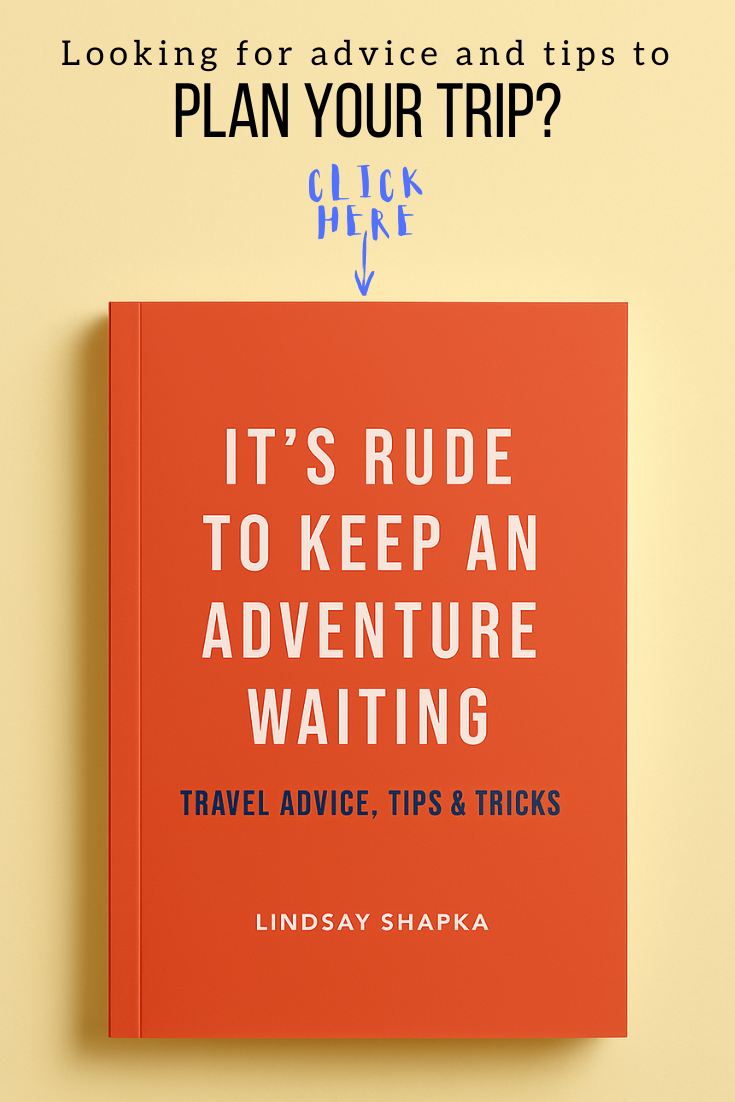This guest post is written by inspiring travel blogger Emma Fell of GoBigEmma. Read more about Emma at the end of the post. All photos in this post were taken or supplied by Emma.
The travelers of this world understand why traveling is addictive. There is this thrill of being in a new place, the sensation of experiencing something that you can only experience in this one exact spot. Sometimes it is the vibe of a Central American beach town or an Asian metropolis that captures your heart, sometimes it is a remote stretch of wilderness that takes your breath away. The exhilaration of travel is enough to make you wonder: What if I could just keep traveling forever?
While “forever” might not be a realistic goal for most, long-term travel is a reality for many passionate travelers. During my own travels, I have met many people who have been traveling for a year or more. It wasn’t until I moved into my 1975 VW bus that I got the chance to see for myself what it was like to travel for “forever”.
My boyfriend and I intend to drive our bus along the Panamerican Highway from Alaska to Argentina, a popular overlanding route. We’ve been camping and living out of our car for over a year. We’ve done a lot of car repairs, visited many unforgettable places and met even more unforgettable people. Travel has become synonymous with living. On the day that marked our first year on the road, we found ourselves in Puerto Escondido, Mexico.
The dream: Travel as a lifestyle
How did I like traveling for a year? I asked myself. I watched the sweat dripping down my arm in the tropical heat as I pondered the question. The answer I would have given a year ago didn’t apply anymore: Travel is travel, what isn’t there to like? Before this trip, my longest traveling stints had been a meager eight weeks or so. Traveling for a year had been the dream, but what did the reality look like, now that I was there?
Quite different, of course. There are a number of things that we have struggled with along the way that make that answer more complicated.
Long-term travel involves much more planning and investment than shorter trips. Before, traveling had always been a break from normal life for me. You lock the door, go somewhere fascinating, explore parts of the world you have never explored before. But eventually, you come back, unlock the door, and let your usual life continue. Long-term travel, on the other hand, takes your everyday life with you. There is a simplicity to giving up most of your possessions and not leaving rent or a sublet waiting for you when you return. However, that also means you need to store or take everything else you might want or need with you, which comes with certain complications.
Getting from A to B (with all your stuff)
One of the biggest questions is how will you travel? What will be your main mode of transportation? Will you backpack, or overland (travel - and often live in - a vehicle)? Will you travel by bus or by plane? Will you stay in hotels or hostels? Or even a tent? We decided to overland it and live in our vehicle. Old VWs are especially reputable for this. Overlanding did mean, however, that we had spent most of the last year camping. This was fine for us, but it’s not everybody’s thing. Two of the hardest questions traveling in a vehicle - which will apply to all long-term travelers, no matter the mode - was What will we take with us? and Where will we put it all?
If you are a backpacker, this question might sound ridiculous to you - you are more than used to reducing your material possessions to those that you can literally carry on your back. A vehicle is, in the end, no different. You just have more space to work with, but also likely an actual living space — such as a bed — to transport as well. All space is valuable.
Up in Alaska, we were happy to have brought our winter hats and scarves with us. Now, in southern Mexico, we wonder why they are taking up valuable space. I keep them there, however, because I know I will be wandering through new climates again before I know it. Long-term travel means taking everything you might need with you or spending money multiple times on acquiring it. Packing and climate go hand in hand. Can you fit your winter coat in with your flip flops? Or will you buy your flip flops when you get there?
Travel can be cheap, but it isn’t free
Speaking of buying things: Traveling for over a year will cost you money. Making use of great resources like Couchsurfing is helpful, but you will still be paying for transportation costs, food, any activities you want to do, and many other things. For us, we can surely add camping, car repairs, and phone cards (aka mobile Internet access) to that list. Travel can be cheap, but it isn’t free.
There are two common options to solve this problem: Make enough money before you leave, or be prepared to disrupt your travels to earn some on the way. We did both. Freelance writing, however, can be a competitive field, and working means we need a lot of Internet access and spend a lot of time on the computer. While a cozy beach camp is a much better work space than an office cubicle, it is worth considering to save up money and have your finances taken care of before you leave. Either way, you will need to find a way to make long-term travel sustainable, or it will be over before you even start.
Pick your travel buddies with care
I am fortunate not to be traveling alone. I have never preferred traveling solo and definitely wouldn’t want to do a trip of this scale by myself. Travel partners offer a lot: Company, shared experiences, a second set of problem-solving hands, just to name a few. On the other hand, be prepared to share a very small space - especially if you are traveling in a vehicle. However, travelers of all kinds can appreciate the fact that no matter how you travel, you will be spending a lot of time with your travel buddy.
There will always come situations where you will, at the least, want to scream at each other. At the most, you may want to drive away and leave your partner standing in the dust (the first strategy is recommended!). You will get to know each other intimately, including many habits you may prefer to know nothing about.
If you decide to take someone with you, make sure it is the right someone. Just because you don’t know each other long doesn’t mean you won’t get along in a small space and tight situations. Tessa and Dillon of The Bus and Us (who also traveled the Panamerican highway in a VW bus in 2015) only knew each other for six months before setting off on their travels and continue to travel together today. However, if you are not very familiar with each other, you should ask yourself some questions: Will it matter a lot to you if you realize you have to go your separate ways? And will you be okay doing this in a place that is likely both far away from home and foreign?
Where are you going?
Speaking of foreign. Although some enjoy complete spontaneity when it comes to travel, most people have at least a general idea of where they want to go. Our goal is to drive from Alaska to Argentina (and the answer to your question is No, we don’t know what we will do after we get there). This means we have a definite start and end destination, and are planning on going through a total of 22 countries on our way. A year into our trip, we have three countries down and 19 left to visit.
Many people choose international travel simply for practicality’s sake: Unless you only want to explore a huge country like Canada, the USA, Australia, or Russia, you probably don’t want to spend a whole year traveling in a single country. In addition to this, wherever you travel internationally, you will have visa issues to think about. These two reasons are why many people choose a region of the world for long-term travel. Others meander through multiple regions or decide to do an around-the-world type of thing.
The point is that if you decide to travel long-term, you will probably be traveling internationally. Have you traveled internationally before? If not, this is something to think twice about before deciding to do it for over a year. Don’t get me wrong - international travel is a mind-blowing experience like no other, but it can also often be complicated, annoying, or straight up frustrating.
Be prepared to be confronted with stereotypes, and practice overcoming them. Expect to learn at least some of a foreign language (no, you cannot only get by with English all over the world, so forget about that now), handle many miscommunications, get lost, and try multiple times before things happen how you think they should. Be prepared to adapt your concept of how you believe things should happen, too. International travel is always full of surprises. It is part of the beauty of it.
But it is not a passion for everybody. You might very well find yourself happy with these experiences in smaller doses, but not with a constant stream of internationality. It all depends on you and your expectations.
The guide to long-term travel: Try it for yourself
Is long-term travel for you? There is no guide to long-term travel. You cannot hire a guide to show you the way. The only way to find out is to try it for yourself. It is an experience that can never be accurately reproduced or described by anyone. Your version of long-term travel will not be the same as mine or anybody else’s that you read on the Internet.
But it will be your version. There is no right or wrong way to do it. You may find that none of my advice applies at all because you are the expert of your experience.
There is no guide to long-term travel because you don’t need a guide, you just need to be yourself.
The rest will work itself out.
Trust me.
This is part of a guest post exchange with GoBigEmma. Check out The Anthrotorian's post, "How To Not Kill Your Travel Buddy" on Emma and Sven's blog here!









